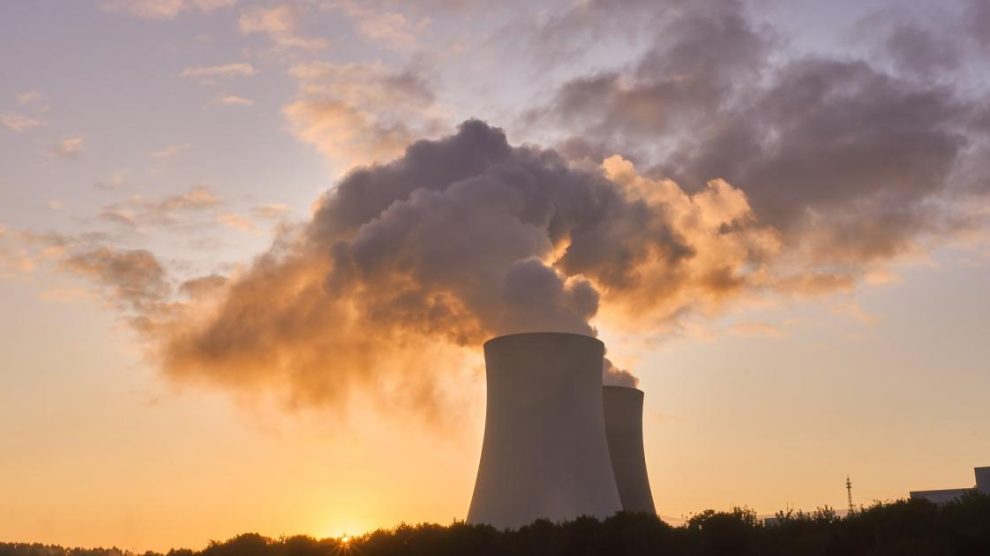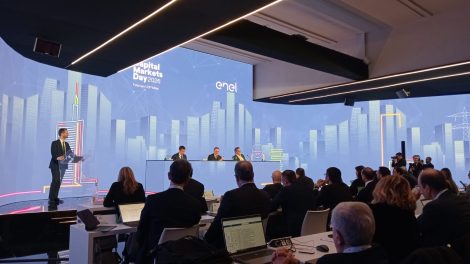Blue power’s (un)expected comeback. Nuclear is making headlines again in de-nuclearised Italy – but this time around, it’s about bringing it back. Back in May, a strong majority of MPs committed the government to evaluate the role of nuclear power in the country’s energy transition plans. And two key ministers confirmed the executive is fully behind this initiative.
Times have changed. For years, even talking of atomic energy would trigger an instant backlash. But today, argued Gilberto Pichetto Fratin (Italy’s Minister for the Environment and Energy Security), those taboos have fallen. Speaking at an event in Parliament on Thursday, he vowed to “move forward at a rapid pace” to foster nuclear research and investment…
- … while pointing out that no credible path to reaching net-zero emissions by 2050 exists without atomic energy, “the way forward.”
- Deputy Prime Minister and Foreign Minister Antonio Tajani extolled its virtue as a valid and “very pragmatic” solution to reduce energy dependence on foreign countries and combat climate change.
Academia’s resilient prowess. Despite decades of anti-nuclear sentiment – and virtually no funding for fission research over the past years –, the country’s intellectual capital is in great shape. Italian researchers and partners have recently set a new record with their involvement in over half of the projects backed by Euratom, the European Union’s nuclear power.
- Marco Ricotti, President of the Consortium of Italian Universities for Nuclear Research, also spoke of an 80% rise in course enrolment over the past three years. That’s because today’s youths have shed their parents’ ideological resistance, he noted, and are open to effective solutions to counter climate change.
- Still, there is “an urgent need to train new experts.” Considering Europe’s ambitious nuclearisation plans, Professor Ricotti expects “pressure in the field of human resources.”
Institutional entities such as the National Agency for New Technologies (Enea) are still involved in the research sector, as its president Gilberto Dialuce recalled. That includes leading-edge fields, such as dissipating energy from fusion reactions (with a plant under construction near Rome from 2024) as well as small modular reactors (SMRs) and fourth-generation nuclear power.
- The latters are slated to use a molten lead cooling system and spent fissile material of old reactors as fuel, which would help alleviate waste management by closing the resources cycle.
The industry’s still got it too. Despite the shortage of contracts on national territory, Italy’s companies are still in good shape. “It’s hard, but we manage to remain competitive,” explained Riccardo Casale, CEO of Ansaldo Nucleare. As a services integrator along the entire nuclear industry supply and production chain, the company’s engineers have worked with all kinds of technologies and have been the “undisputed leaders” in the EU in the fourth-gen lead reactors for 20 years, he said.
- Together with Edison, Ansaldo Nucleare recently inked a deal with European leader EDF to develop next-gen plants. And it was Italian engineers, noted Mr Casale, who alleviated the French nuclear fleet’s maintenance problems.
- Italian titan Enel also retains its expertise in construction, licensing and permitting – as evidenced by its own agreements with European leaders, explained chief innovation officer Nicola Rossi.
- On the fusion front, ENI-controlled Commonwealth Fusion Systems (the MIT spin-out company that’s attracted nearly $2 billion in financing) is among the private companies with the most ambitious roadmaps for bringing fusion energy to market.
What’s missing? Participants were nearly unanimous in noting that solving the age-old (and somewhat embarrassing) issue of where to stock nuclear waste – as any plan for the future repository has always been met with hostile resistance – would be an excellent signal that the country and its political figures are capable of handling a future industrial complex.
- Prefect Fiamma Spena, who is in charge of this as head of State-controlled Sogin, went on to call for a qualitative leap in terms of communication to “bridge the information gap” and combat the Nimby (not in my backyard) syndrome.
Looking ahead. As for an actual nuclear plan, it’s still very early days. The next energy-related development will happen in October, when the Meloni government will unveil its Mattei Plan (hinged on mutually beneficial energy and investment cooperation with African nations) – so it’s highly unlikely anything could happen before that.
- As Minister Pichetto Fratin noted, the executive is in the process of evaluating options and identifying what sort of technologies and what manner of using them is best suited to the country’s needs.
- Barring major political shake-ups, a tentative nuclear plan could be expected in 2024. Chances are it could contain a solution to the waste problem (such as the use of military grounds for building the plant) as well as measures to support the industry and a pathway for political consultations – which would then be the bedrock for building actual plants.





